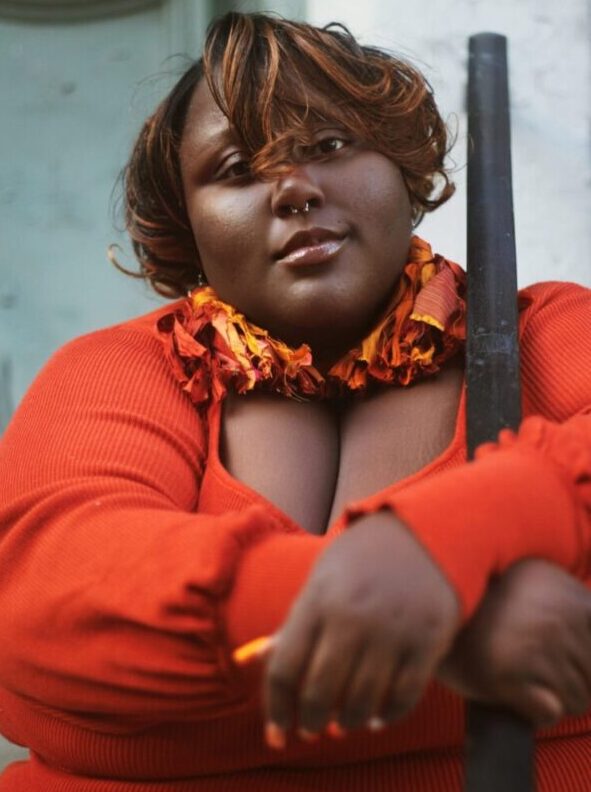Chosen from a pool of 120 applications, the 10 selected ventures cover a range of fields and goals, from carbon-neutral building materials to supporting a woman-rich STEM future. Each venture is set to receive individualized business guidance and technical assistance from a network of consultants and SIL alumni. Plus, upon completing the program, each venture will be awarded a $5,000 grant.
After this iteration of the entrepreneur support program concludes in the spring, each venture will have the opportunity to present at a showcase in front of an audience of investors, friends and fellow cohort members. There, they will compete for the coveted cohort prize.
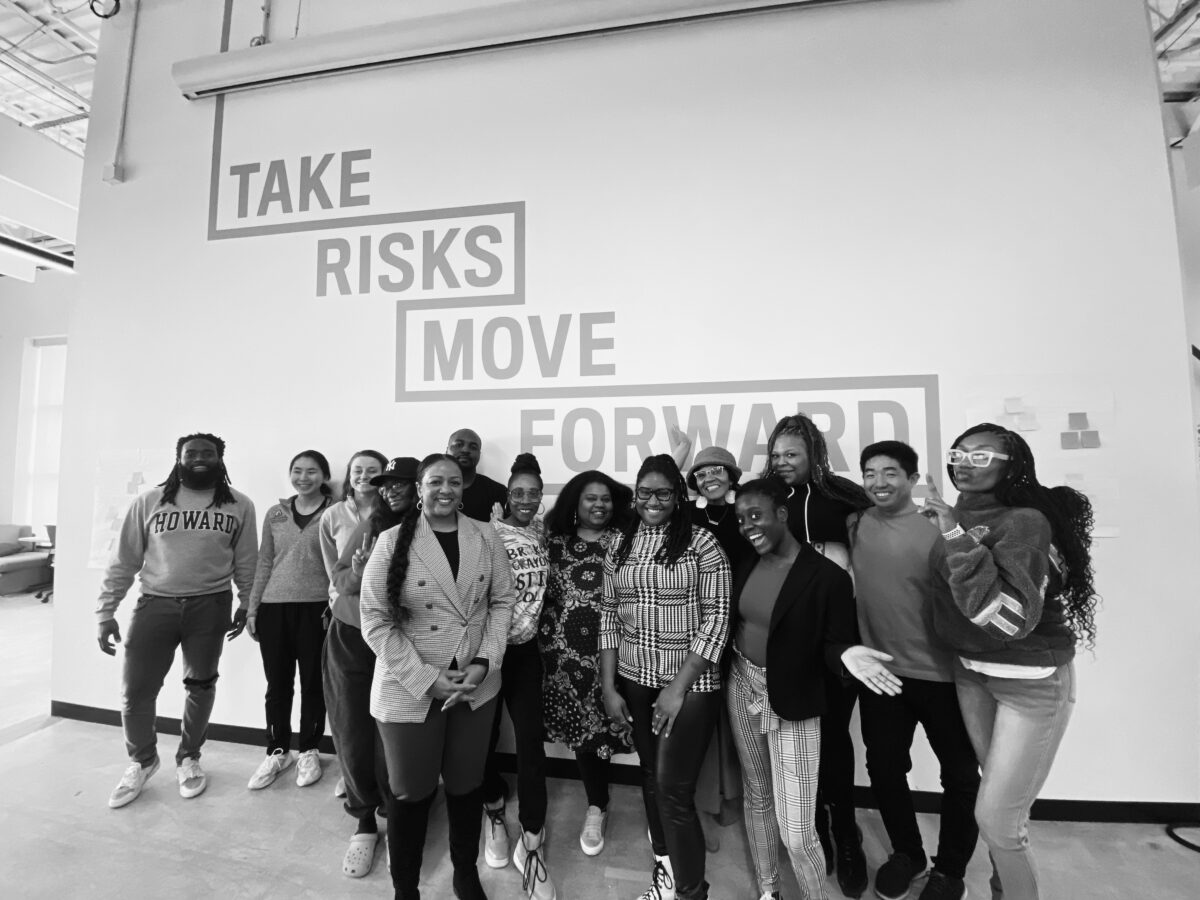
The fall 2023 SIL cohort on Jan. 27, 2024. (Courtesy Anthony Watters/Alanah Nichole Davis)
Past winners include Parity founder Bree Jones in 2020. Jones was a cohort mate of 2023 RealLIST Connector and current SIL director Anthony Watters.
SIL’s got a mix of in-person and virtual offerings for its cohorts, which are open to both students and non-JHU-affiliated entrepreneurs. So far, only the 2020-2021 cohort met virtually full-time. SIL intends for its cohorts to meet monthly for a “Super Saturday” event. At Watters’ invitation, Technical.ly got in on the action at this month’s gathering inside FastForward U’s Remington offices.
The guest speaker for the cohort that day was Wearable Tech Ventures founder LaKisha Greenwade. In preparation for the next module, which focuses on business models, she led a workshop on customer discovery. She opened the session with a bit of mindfulness and breathing exercises.
“I am worthy,” said Greenwade, who invited the entire room to join in by repeating after her.
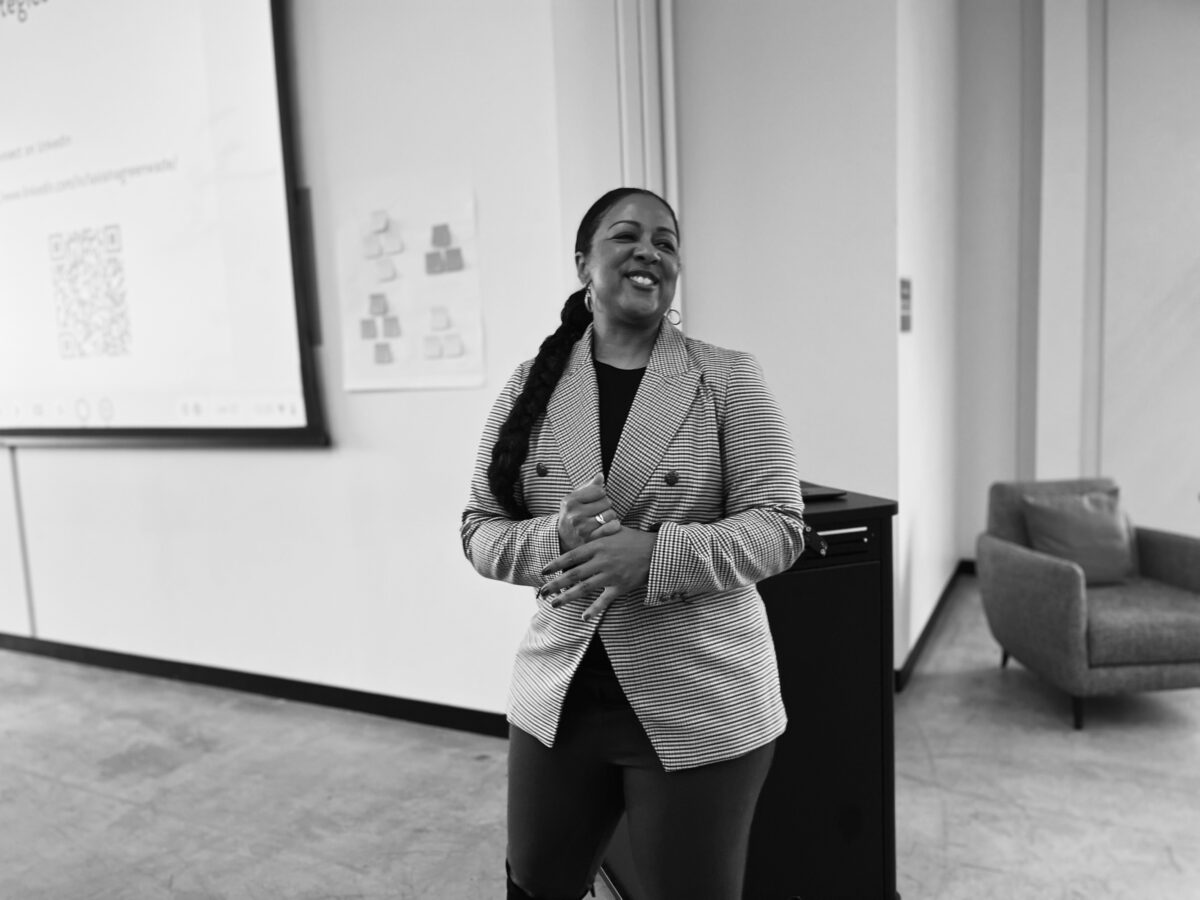
LaKisha Greenwade. (Technical.ly/Alanah Nichole Davis)
Non-tech community venture
Greenwade continued with a slideshow and posed a question to the group: “Why are we doing this?”
SIL cohort member Kadija Hart, program coordinator of Project Healthy Communities, answered.
“We have to give the people what they want,” said Hart, an alumna of Morgan State University, Maryland Institute College of Art and the Johns Hopkins Urban Health Institute’s Bunting Neighborhood Leadership Program.
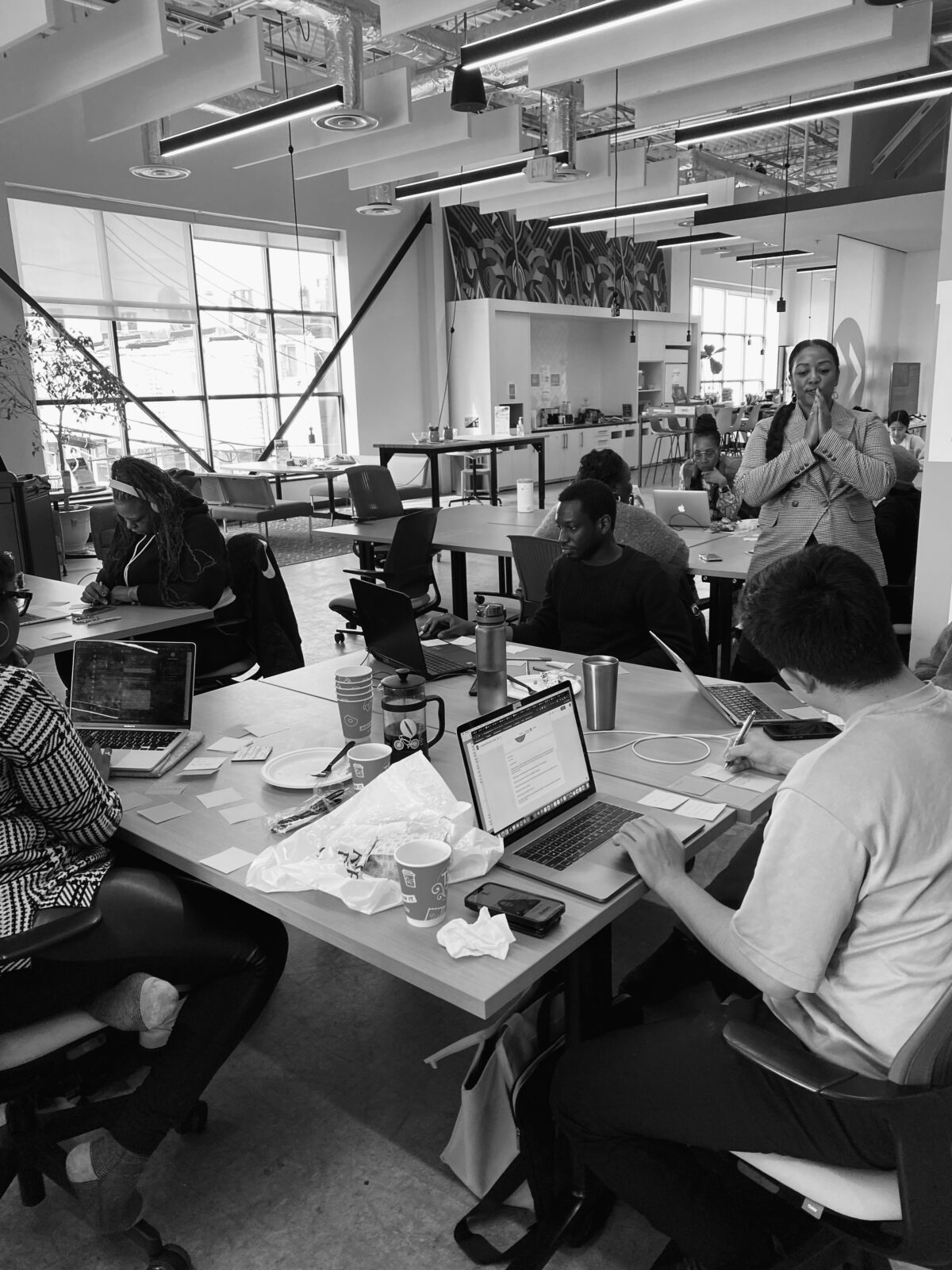
SIL Super Saturdays. (Technical.ly/Alanah Nichole Davis)
Hart brought along her colleague LaQuida Chancey, who graduated from the Baltipreneurs Accelerator while working with her housing initiative Smalltimore Homes.
Hart and Chancey became acquainted through community work in the 21218 zip code. Hart highlighted the importance of cultivating relationships with end-users who could benefit from the programming offered by any of the current cohort’s ventures. Hart said she learned about customer discovery before Greenwade came to visit SIL and offered her own insights into how important community is in the founding of a venture.
“I think it [being in community] is extremely important because the work that we’re doing is only going to be sustainable if it’s going to be done with the end-user in mind,” said Hart. “So it’s really important for us to make sure that we’re going out to find those who are going to be buying into our programs or initiatives or our products, whatever it is that we’re doing. Because, again, it’s truly been codesigned with them in mind.”
In preparation for Saturday, the duo leveraged an existing connection with Grace Baptist Church on The Alameda for customer discovery interviews.
“Being able to invest the time to make relationships in community and understand their pain points and what it is that they’re wanting is extremely important,” said Hart.
Chancey, a self-proclaimed serial accelerator-goer who currently serves as a digital inclusion fellow for Open Works, said that she had faced rejection from the SIL program on multiple occasions. Notably, she continues to uphold the value of entrepreneurship support programs due to her connection with Innovation Works. Going forward, she hopes to receive funding from Ignite Capital soon.
Youth entrepreneurship
At the age of 17, Shani’a Stevenson, a senior at Baltimore Leadership School for Young Women, is the youngest entrepreneur ever accepted into the Johns Hopkins accelerator program.
“Starting at Dent Education, that’s actually where I started to actually want to become an entrepreneur,” said Stevenson, who said she’s recently onboarded to the Baltimore City School’s youth council. There, she hopes to share input that might improve Baltimore City’s school systems.
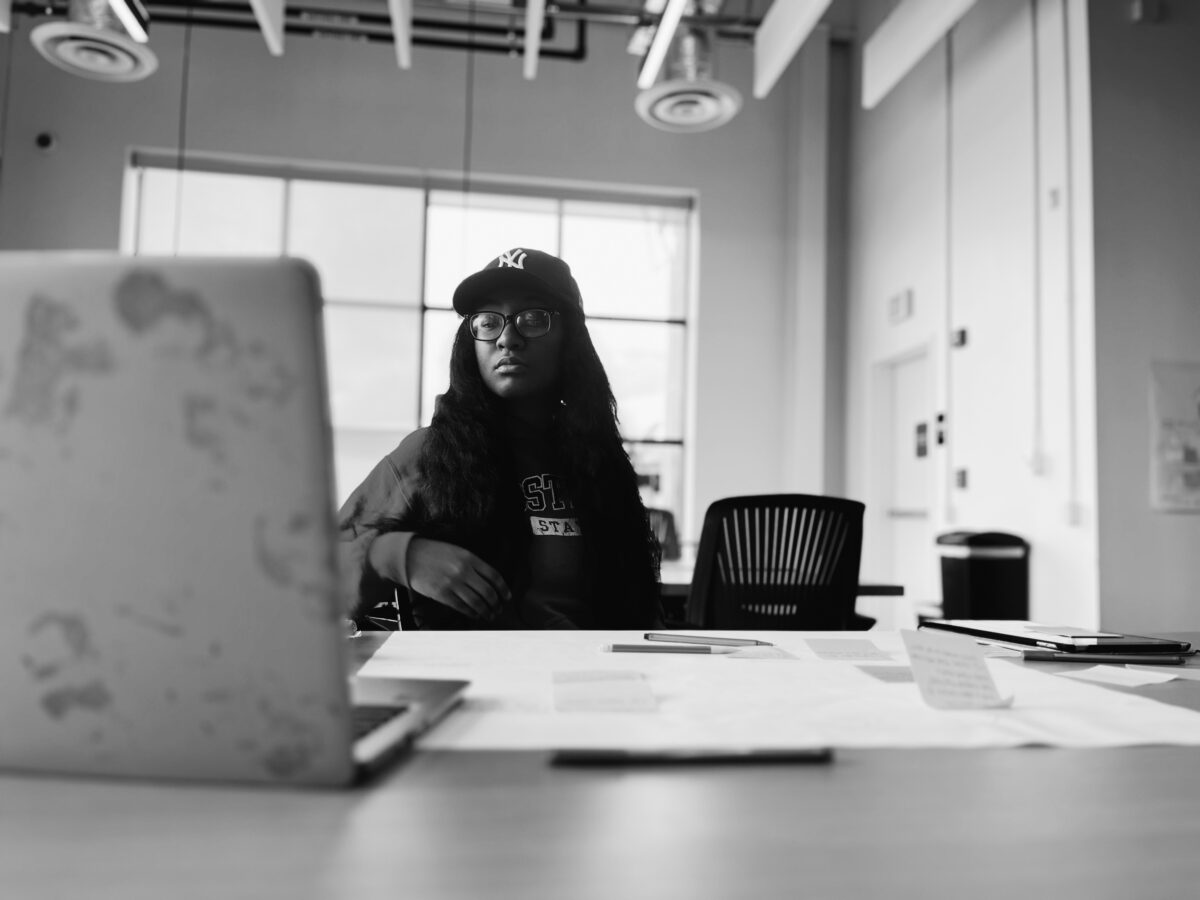
Shani’a Stevenson. (Techncial.ly/Alanah Nichole Davis)
The founder of NAV, a venture aimed at creating a stigma-free mental health community for teens, was intently engaged on Super Saturday and gathering information for crafting her deck. She shared insights into the experience of transitioning from youth entrepreneurship to engaging with adults.
“So it’s definitely something I’m still trying to get adjusted to. It’s that I’m the type of person [who] gets that sense of out of placeness,” said Stevenson. “And actually when I do talk to teens my age [or] my navigators, I let them know about the awareness I have within myself with that out-of-place feeling, and also being a student and teenager living in Baltimore.”
She said that having a sense of being out of place is a pretty typical aspect of entrepreneurship — a realization gained from her over two years of experience with NAV, which she founded at the age of 15. Having successfully secured $20,000 in funding for her project, she hopes to use any forthcoming financial support to further develop workshops and mental health services for more teenagers in Baltimore.
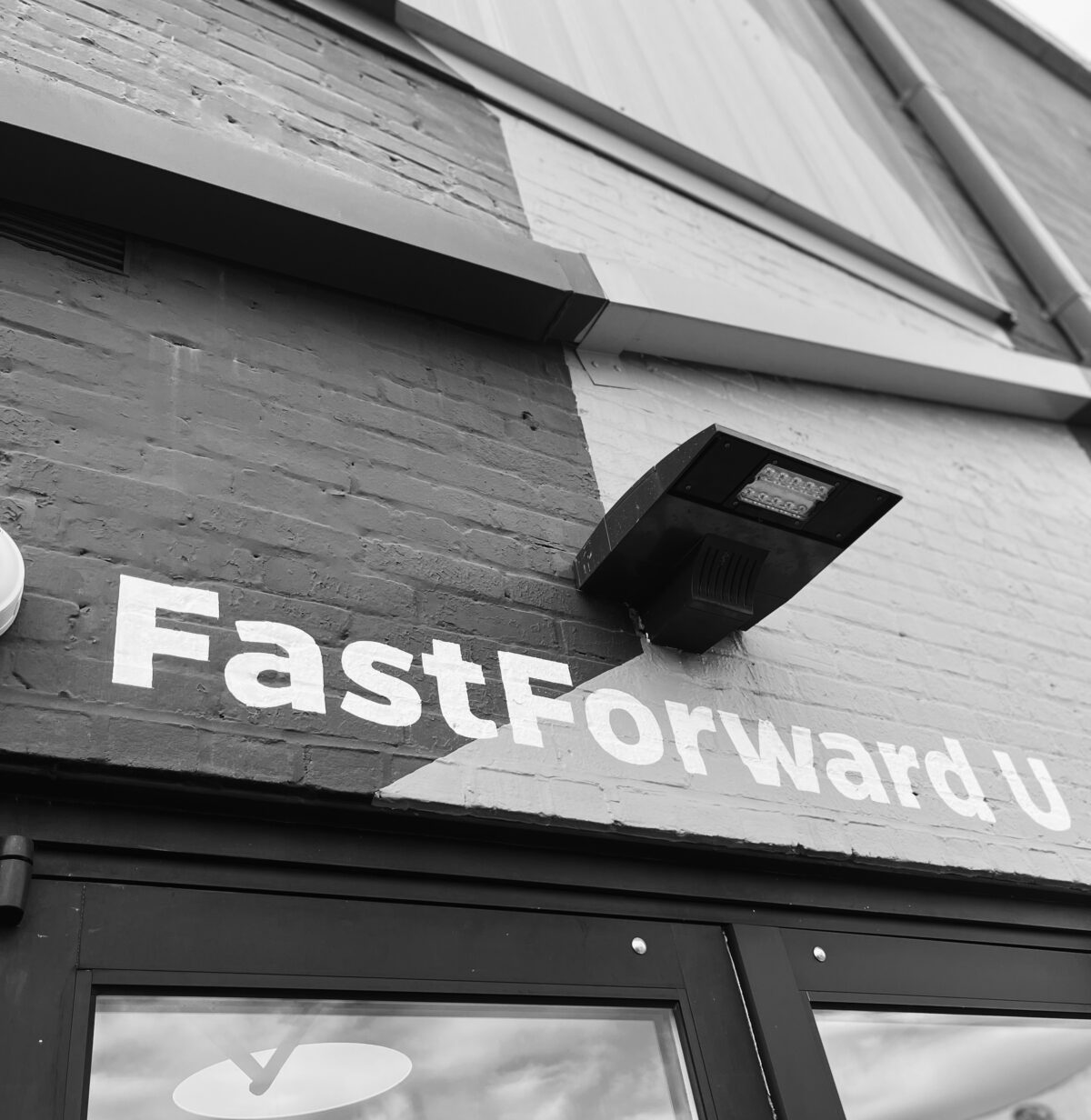
FastForward U. (Technical.ly/Alanah Nichole Davis)
Community tech venture
Shawna Stepp-Jones, the founder and CEO of Divaneering Lab, made an appearance at SIL’s Super Saturdays as one of its newest cohort members. The Morgan State University and Johns Hopkins University alum asked questions and offered insights while fresh off her pitch competition win for her hardware-focused beauty and tech company.
The Techstars Equitech accelerator alum said she was accepted for Divaneering Impact Lab, distinct from the invention with which she won Open Works’ EnterpRISE Pitch Competition. With her social impact venture, she hopes to increase the number of women and girls engaged in STEM by using practical applications in the realms of health, beauty, and fashion.

LaKisha Greenwade (standing) facilitates a session. (Technical.ly/Alanah Nichole Davis)
“So young ladies are making lip gloss out of crayons, so, getting that first exposure with molds,” said Stepp-Jones, who has a background in hardware engineering and intellectual property. “We have [another program] where young ladies are focused on creating fashionable button pins using mechanical arms. We have Rapunzel lift up your hair, hon. That’s [a] very niche curated one, but it’s our way of getting girls interested in structural engineering for hair design. So we give them 30-inch wigs, we give them a whole bunch of different hair tools and materials, and they’re challenged to build the tallest, strongest beehive.”
She said each of her impact programs boasts cultural relevance. The former US patent officer thinks of herself as the modern-day Madam C.J. Walker.
“I use the Divaneering as my platform to allow me to go into classrooms with young ladies and really open up their minds, and my physical being and beauty, and really try to help them delve deeper into having a beautiful mind, a beautiful heart, beautiful spirit and just cultivating beauty and other ways intentionally,” said Stepp-Jones, who is also Miss Maryland Plus America 2013.
Learn more about the fall 2023 SIL cohort
Before you go...
Please consider supporting Technical.ly to keep our independent journalism strong. Unlike most business-focused media outlets, we don’t have a paywall. Instead, we count on your personal and organizational support.
3 ways to support our work:- Contribute to the Journalism Fund. Charitable giving ensures our information remains free and accessible for residents to discover workforce programs and entrepreneurship pathways. This includes philanthropic grants and individual tax-deductible donations from readers like you.
- Use our Preferred Partners. Our directory of vetted providers offers high-quality recommendations for services our readers need, and each referral supports our journalism.
- Use our services. If you need entrepreneurs and tech leaders to buy your services, are seeking technologists to hire or want more professionals to know about your ecosystem, Technical.ly has the biggest and most engaged audience in the mid-Atlantic. We help companies tell their stories and answer big questions to meet and serve our community.
Join our growing Slack community
Join 5,000 tech professionals and entrepreneurs in our community Slack today!

The person charged in the UnitedHealthcare CEO shooting had a ton of tech connections

From rejection to innovation: How I built a tool to beat AI hiring algorithms at their own game

Where are the country’s most vibrant tech and startup communities?

